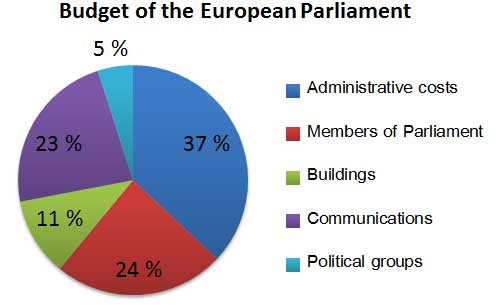Budget of the European Parliament

Photo: European Parliament
The European Parliament is the institution that checks and approves the EU budget. The Parliament’s own budget is about 1 per cent of the EU’s total budget. It is used for running the Parliament. In 2012, the budget was € 1,781 billion (1,718?). The European Parliament’s budget accounts for about one fifth (1/5) of the all the administrative costs of the EU.
Administrative costs of the European Parliament
37 % of all the EP’s budget is used for paying salaries. The General Secretariat alone has 6,000 civil servants. Also, the budget covers interpretation, translation and staff travel expenses.
Of all the administration expenses, the cost of translation is high. The European Parliament is the most important democratic institution of the European Union. It passes laws that are binding on all member states. Because the members of the European Parliament (MEP) come from countries all with own languages, it is important to ensure that they understand all the discussions and texts correctly. That is why there is a large number of translators and interpreters working for the European Union. Interpretation and translation services are also bought from service providers outside the Parliament.
There are 23 official EU languages. Other regional languages are also used when necessary. In the Parliament, the MEPs may use any official language they wish. This is because it is important to ensure that all MEPs can work in the Parliament on an equal basis. Over one million pages of text are translated for the European Union every year. The Translation and Interpretation Committee is responsible for all the language services offered to the EU institutions.
Other costs

European Parliament budget.
Percentages in 2012.
About 24 % of all the budget is used to cover the expenses of the MEPs. There are MEPs from all the 27 member states. Their salaries, travel cost, office expenses and the salary of the personal assistant are all paid out of the budget.
About 11% is reserved for the maintenance of the Parliament buildings. It includes building maintenance, purchases, repairs and rents. The buildings are located in Brussels, Luxembourg and Strasbourg. All the 27 member states also have a Europe Information office.
23% of the money goes to communicationswhich includes IT and telecom services.
5% is reserved for the activities of the political groups.
Preparation of the budget
The preparation of the European Parliament budget starts in February. The Secretary-General makes a proposal for the most important objectives for the following year and the resources needed to achieve them. The preliminary budget proposal is approved by the Bureau of the Parliament. The proposal is submitted to the Committee on Budgets.
A report is prepared by the budget rappoteur. The report highlights priorities and makes a proposal for the amounts of money to be given. The Committee votes on the report. When the Committee has approved the report, it will be forwarded to the Parliament. The proposed budget is evaluated by the plenary session of the Parliament in May. The ex-ante evaluation is attached to the EU’s budget.
The Parliament examines the EU’s draft budget in the autumn. The budget is approved by December, if not earlier. It takes effect at the beginning of the following year.
- Click here for more information on the budget of the European Parliament.
- Click here for more information on the budget of the European Union.



